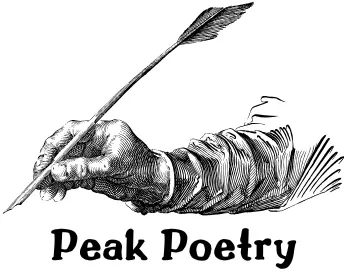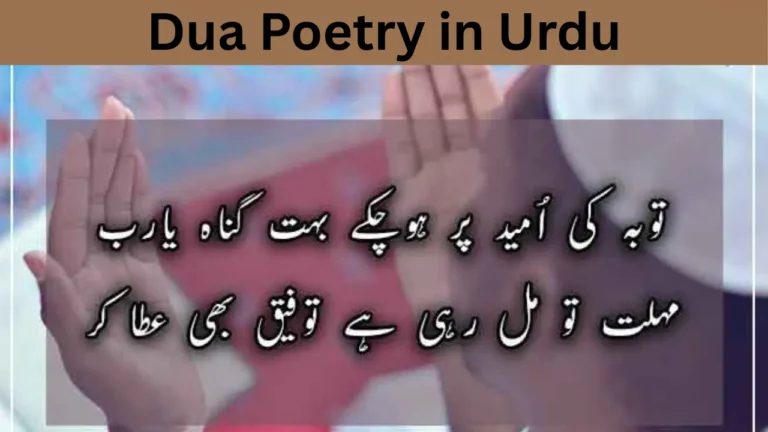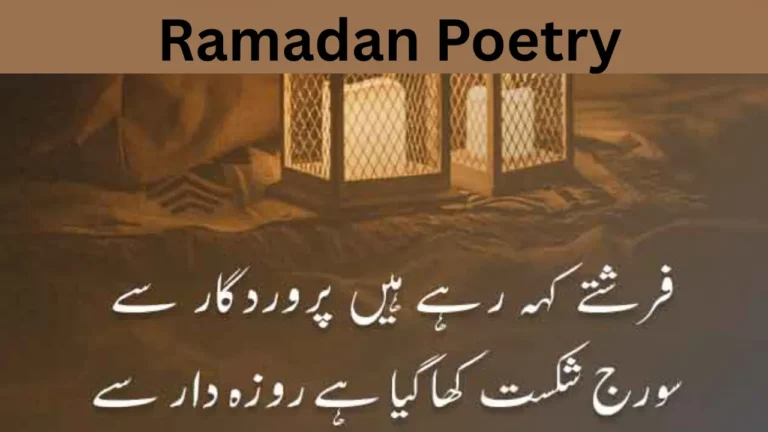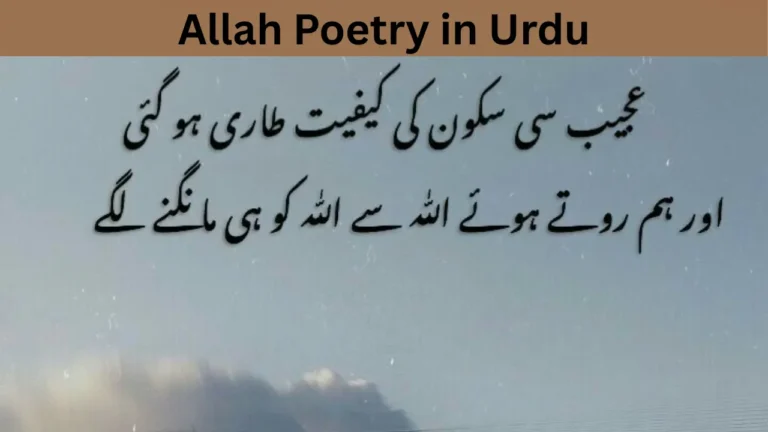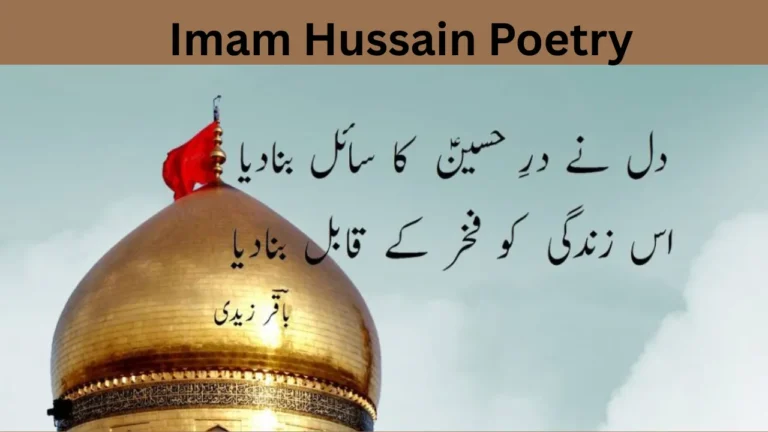Islamic Poetry: A Spiritual Journey of Faith, Words, and Love
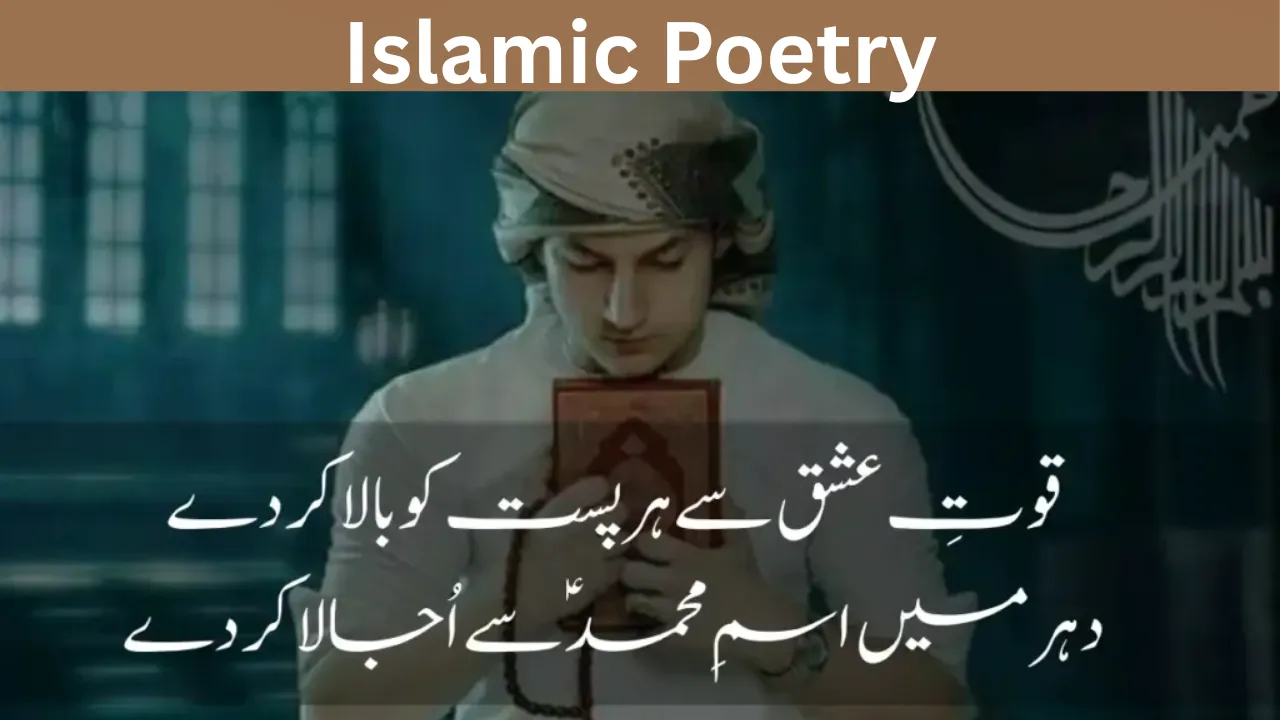
Islamic poetry is the soul’s whisper wrapped in rhythm. It expresses love for Allah, deep respect for Prophet Muhammad (PBUH), and a longing for the hereafter. For centuries, poets have used this divine art to inspire, teach, and guide. Their words live in the hearts of millions, blending beauty with belief.
From Arabic deserts to the lanes of Urdu literature, this sacred art has grown with time. One popular form today is Deep Poetry in Urdu: A Soulful Journey Through Words, which beautifully captures emotions rooted in Islamic values. These verses are not just recited — they are felt.
The Origins of Islamic Poetry
The tradition of Islamic poetry began in the time of Prophet Muhammad (PBUH). Early poets like Hassan ibn Thabit used their talents to protect Islam through words. He was known as the “Poet of the Prophet.”
His verses defended the faith and uplifted the early Muslim community. Poetry was not just entertainment — it was a weapon of truth and a source of strength.
“Unki misal kya doon, wo Noor ka darya hain,
Nabi ke chehre se roshan ye saara jahan hai.”
These lines reflect a deep love and admiration for the Prophet. Islamic poetry like this continues to serve as a mirror to faith.
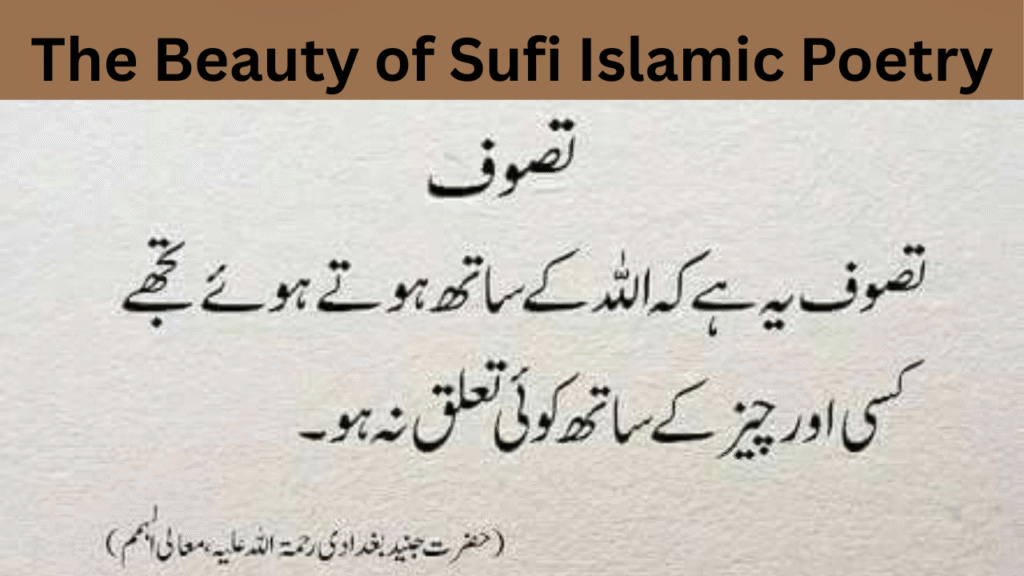
The Beauty of Sufi Islamic Poetry
Sufi poets explored Islamic poetry in a deeply emotional and spiritual way. Names like Rumi, Hafiz, and Bulleh Shah come to mind. They expressed divine love, the thirst for truth, and surrender to Allah through poetry.
Here’s a famous translated verse by Rumi:
“Your light is more magnificent than sunrise,
Your love more eternal than the skies.”
Sufi poetry reaches beyond rituals. It touches the heart, purifies the soul, and brings one closer to the Creator.
“Main uske dar ka faqeer hoon,
Jo sab kuch dekar bhi mujhse pyaar karta hai.”
This is the essence of Sufism — deep, unshakable love for Allah.
Islamic Poetry and the Prophet (PBUH)
One of the most common subjects in Islamic poetry is the beloved Prophet Muhammad (PBUH). His personality, kindness, and teachings are often described in naats.
“Madine ki fizaon mein woh mehek ab bhi hai,
Nabi ka pyaar har saans mein ab bhi hai.”
These couplets express the timeless love Muslims feel for their Prophet. Naat recitation is an important part of Islamic events, especially during Mawlid (the Prophet’s birthday).
Such poetry helps strengthen the emotional bond with the Prophet and encourages following his Sunnah.
Role of Islamic Poetry in Urdu Literature
Urdu, known for its poetic depth, became a perfect medium for Islamic poetry. Great poets like Allama Iqbal, Mir Taqi Mir, and Jigar Moradabadi mixed spiritual thought with poetic beauty.
Allama Iqbal, the poet-philosopher of the East, wrote:
“Khudi ko kar buland itna ke har taqdeer se pehle,
Khuda bande se khud pooche, bata teri raza kya hai.”
Though philosophical, this verse reflects strong Islamic faith, human potential, and trust in Allah’s will. Islamic values blend naturally into Urdu verses, making them emotionally rich and spiritually powerful.
“Ilm ka raasta ho ya ibadat ka safar,
Har raah pe tu saath ho, aye Rab-e-Karim.”
This connection makes Islamic poetry in Urdu a source of both wisdom and worship.
Islamic Poetry and Nature: Flowers and Faith
Nature is often used in Islamic poetry to symbolize beauty, purity, and divine creation. Flowers, in particular, play a special role.
In Flower Poetry in Urdu: A Timeless Expression of Emotions, the Prophet Muhammad (PBUH) is often compared to a flower — soft yet strong, beautiful yet humble.
“Phoolon se roshan hai har gulshan-e-haram,
Rasool-e-Khuda hain jahan ki roshni ka sanam.”
Such verses show how Islamic poetry connects beauty in nature with beauty in faith. The fragrance of a flower becomes a metaphor for the Prophet’s character.
“Phoolon mein mehka hai unka zikr,
Har kali bolti hai ‘Ya Rasool Allah’.”
This artistic use of nature makes the poetry more relatable and deeply emotional.
Islamic Poetry for Children and Beginners
Islamic poetry also helps teach children about faith and values. Simple rhymes stick in young minds and carry strong messages.
Here’s a poem for young learners:
“Allah made the sun so bright,
He gives us day, He gives us night.
We pray to Him, we do not fear,
For Allah is always very near.”
Such poetry makes learning about Islam joyful and memorable.
“Nabi ka pyaar, sabse azeem,
Har masla mein woh hai raheem.”
Even beginners can feel a strong connection through simple, loving verses.
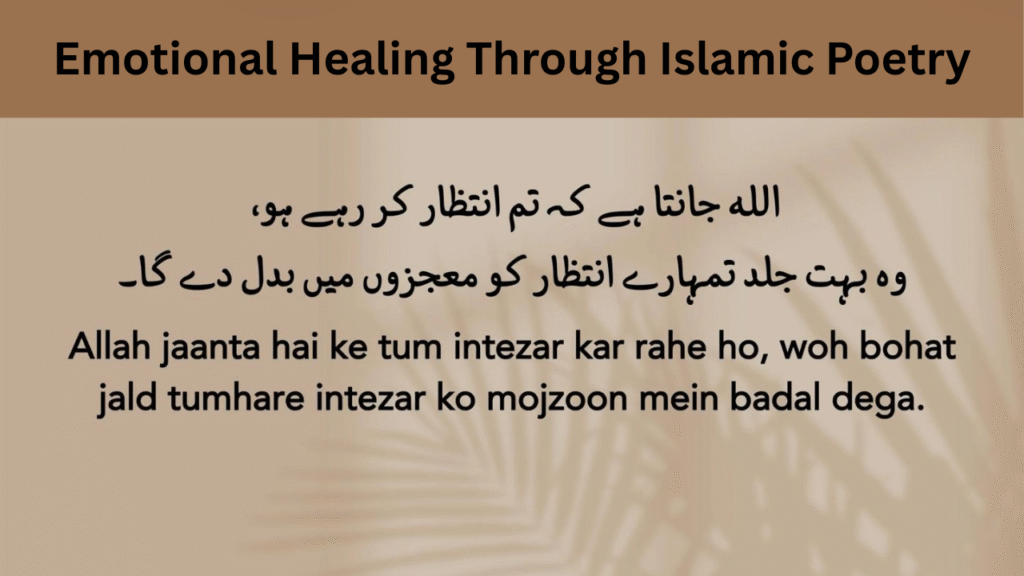
Emotional Healing Through Islamic Poetry
Islamic poetry is not just spiritual—it’s also healing. People going through grief, loss, or sadness find comfort in verses praising Allah and remembering the hereafter.
“Har gum ka ilaaj hai, bas uska zikr hai,
Jo rooh tak ko sukoon de, wohi zikr-e-Faqar hai.”
These verses remind believers that Allah is always with them. Poetry becomes a soft light during dark times.
“Musibat ke andheron mein,
Dua ka ujala kaafi hai.”
Poetry soothes the heart and encourages hope.
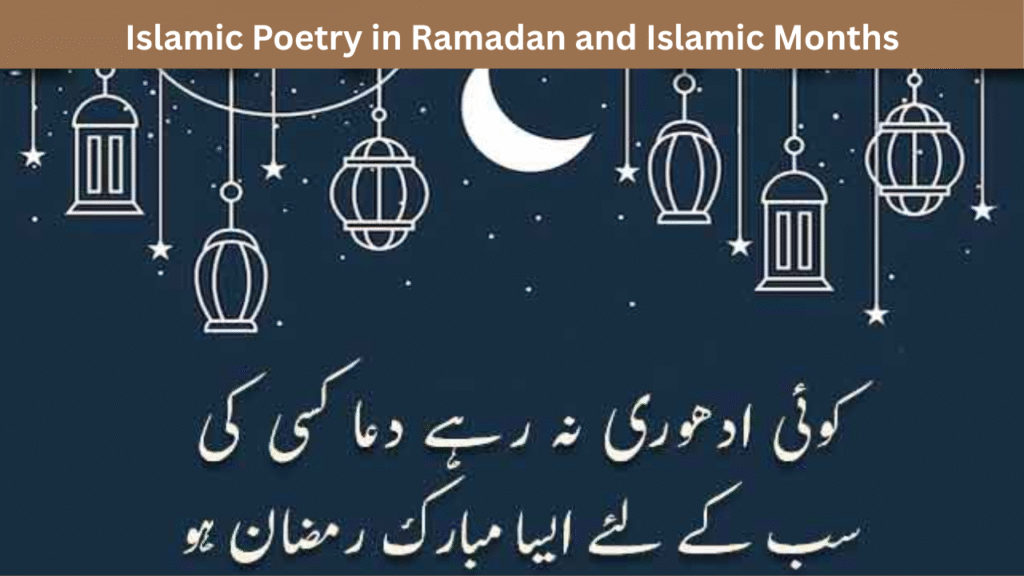
Islamic Poetry in Ramadan and Islamic Months
Special Islamic months bring a revival of poetry in gatherings and events. During Ramadan, Milad-un-Nabi, or Muharram, Islamic poetry is a major part of religious expression.
“Ramzan aaya rehmaton ka saawan ban ke,
Har dil mein jagi duaon ki roshni.”
In Muharram, poets recite marsiyas and nauhas, expressing grief and devotion for Imam Hussain (RA) and the sacrifices of Karbala.
“Karbala ki mitti se likha gaya hai woh fasana,
Jahan khuda bhi jhuk gaya Hussain ke diwana.”
These events refresh the soul and deepen faith, and Islamic poetry is the heart of it all.
Islamic Poetry in Daily Muslim Life
For many Muslims, Islamic poetry is part of daily reflection. People recite couplets after prayer, during travel, or even before sleep. These verses act as reminders of Allah’s love and mercy.
“Subah ki dua mein tera zikr ho,
Raat ke sukoon mein tera fikr ho.”
Some believers even keep small books of naat or hamd in their pockets. Others play audio naats in their homes or cars. It’s not just literature — it’s part of life.
Islamic Poetry on Social Justice and Hope
Islamic poets have also addressed injustice, poverty, and societal issues — always rooted in Islamic teachings. They remind the rich to help the poor and the powerful to stay humble.
“Jise daulat mil gayi, woh fakhr na kare,
Khuda ke ghar mein to sirf niyyat ka mol hai.”
These poems do not just heal individual hearts. They raise the voice of the oppressed and encourage kindness in the community.
Ending with Heartfelt Islamic Poetry
Let’s end this article with a few more soul-stirring verses. These poems reflect the love, humility, and devotion that define true Islamic poetry.
“Jo rooh mein basa hai, wo noor ka jahan hai,
Har lafz mein mohabbat, har baat mein Quran hai.”
“Dil se nikli to dua bani,
Zikr-e-Nabi mein har ghadi bani.”
“Na jaane kis amal pe raazi ho gaya hai tu,
Har waqt teri rehmat ka saya hai mujh pe, Ya Rab.”
These verses are not just lyrics. They are lifelines for those searching for peace, truth, and purpose.
Conclusion
Islamic poetry is the living heartbeat of Islamic culture. It connects people with Allah, strengthens love for the Prophet (PBUH), and brings peace to the soul. Whether you listen to a hamd, recite a naat, or reflect on a sufi verse, each line has the power to change you.
Its role in shaping faith, building character, and healing pain cannot be overstated. It is both timeless and universal — a true gift from the Ummah to the world.
In every age, in every heart, in every language — Islamic poetry lives on.
